Q: Is “covfefe” Aramaic?
A: NO.
Note: I cannot believe that I am writing this… But there has been a spike in Google searches for “covfefe aramaic” lately.
So now you know.
Peace,
-Steve
UPDATE: And when this article hit Twitter, THIS happened:
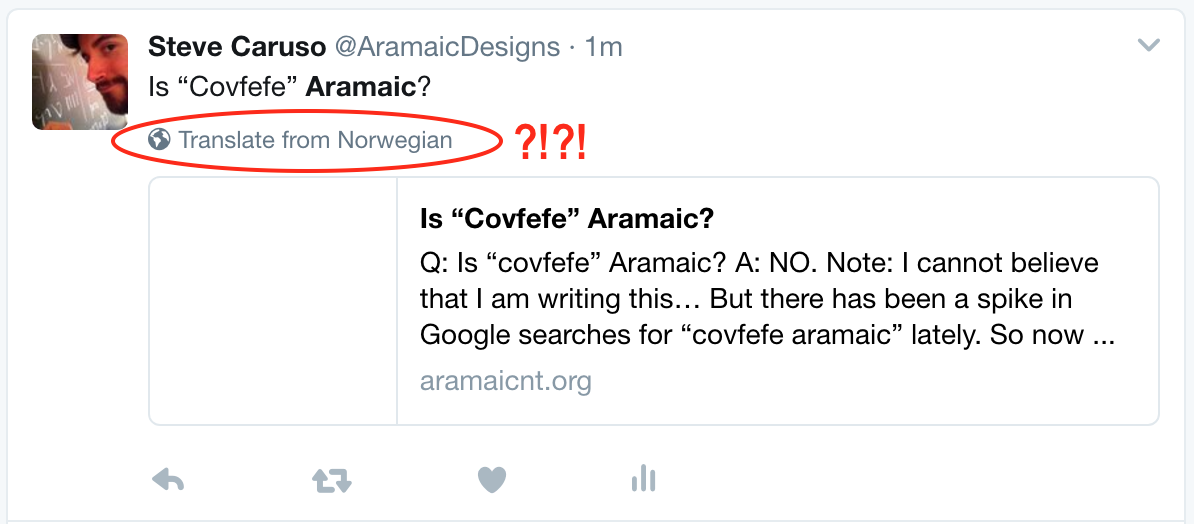
Q: Is “covfefe” Aramaic?
Note: I cannot believe that I am writing this… But there has been a spike in Google searches for “covfefe aramaic” lately.
So now you know.
Peace,
-Steve
UPDATE: And when this article hit Twitter, THIS happened:

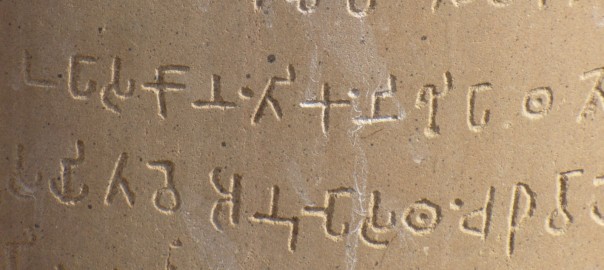
As I’ve mentioned before on this blog, when it comes to Aramaic materials sometimes you can judge a book by its cover.
In this case, it is also a prime example of how a Google search can go terribly wrong. 🙂
Long story short, I came across this book cover a few days ago:
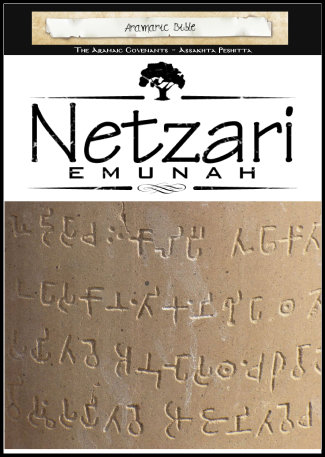
If you can’t make out the text at the top, it reads: “Aramaic Bible: The Aramaic Covenants • Aramaic Peshitta.” Here is an excerpt from this book’s website:
This work is a new edition from translations of the Ancient Aramaic. For example this new edition uses the name of MarYah Eashoa Msheekha (Lord Yeshua Messiah). It also uses the word Allaha for HaShem (G-d). The Ancient Aramaic translates the correct name of ‘Eil witch refers to the ‘Absolutely Eternal’ Allaha, and it introduces the Aramaic rendering of Maran for Lord, Along with other Ancient Galilean Aramaic renderings.
So let’s take a moment to pick this apart and make some sense of it. I could be wrong, but the Netzari website appears to be a Messianic sect in the Sacred Name Movement persuasion that has produced a “new edition” from (apparently) extant translations of Aramaic texts where the names have been changed to (rather poor) transliterations of late Classical Eastern Syriac terms because they — among others — are “Ancient Galilean Aramaic renderings.”
Despite… serious methodological problems, I can at least navigate around all of that and make sense of it… but there is one glaring problem that I don’t get:
Why is there Brahmi text about Buddhism on the cover of an Aramaic book about Messianic Christianity?
Yes, that wonderful carved text is in Brahmi script from one of the Edicts of Ashoka at Sarnath — official declarations issued in the 3rd century BCE in effort to spread Buddhism. Many of the Ashoka inscriptions were bi- or tri-lingual… and this is where the Aramaic confusion comes in.

When this image was originally uploaded to Wikipedia, it was under the title “Aramaic Inscriptures in Sarnath.jpg“. Whoever uploaded it simply made a mistake, as one of the languages that Ashoka did use from time to time was Imperial Aramaic. This image, however, simply wasn’t such an example, so the author subsequently corrected this mistake by changing the description to “Inscription in Brahmi on the pillar of Sarnath.” (Scroll down on the Wikimedia page, you’ll see it.)
However, guess which title Google Image Search snapped up?
As of writing this, if one simply searches for “aramaic” in Google Image search, this is the first nice looking carved inscription that appears in the search results, about half way down the page. Earlier it was much higher, and because of this it has caused all sorts of delightful confusion.
Now, if someone is trying to produce a “translation” of the Aramaic New Testament to help spread their faith in Christianity, but they can’t tell Aramaic apart from an inscription in a different language which just so happens to be about spreading Buddhism that they came across on Google — perhaps they should reconsider what they’re up to. 🙂
Peace,
-Steve
UPDATE: They seem to have taken the hint, and have changed their book cover to a much more boring red-ish-thing. However, they are still going through with publishing it…
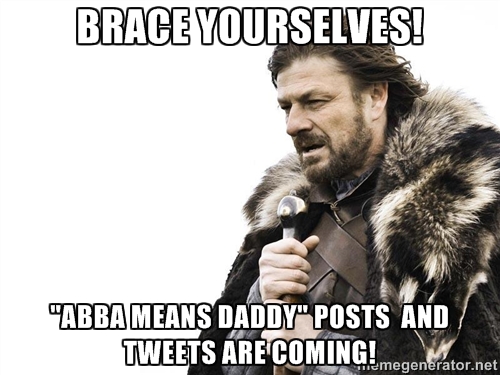
So, repeat after me, “‘Abba’ does NOT mean ‘daddy.'”
One more time: “‘Abba’ does NOT mean ‘daddy.'”
Are we understood? Good.
Yet another year goes by and yet another year this persistent bit of fiction needs to be rebuffed. It is the bane of Aramaicists worldwide: The idea that “Abba” — in Jesus’ native language of Aramaic — is baby-speak, child babble, an informal appellation to call one’s father by. An intimate term that was reserved for a close relationship. It’s silly. It’s rubbish…
However, it is not that simplistic.
אבא “abba” was a term that meant “father.” When used in direct address it did mean “my father.” However, this word was used by children and adults in both formal and informal contexts. You have full grown men referring to their fathers as “abba” and some Rabbis even referring to honored elder members of their schools as “abba” (it’s were we get the word “Abbot” in Christian tradition, even).
However, what makes this very confusing, especially in modern times, is that “abba” was adopted into Modern Hebrew as… you guessed it… “daddy.” This was simply not the case in Jesus’ day. It’s a modern development.
So off you go, with newfound knowledge in hand! Preach against the pulpit fiction. Perhaps the linguists’ headaches will subside… Perhaps…
You can read about its origins here.
And see another fun infographic about it to share here.
In spite of rogue etymology, have a wonderful Father’s Day!
If you’d like to learn more about Jesus’ language, click here.
Peace,
-Steve
Over on Ralph The Sacred River, there is a neat discussion about recent Aramaic sightings in fiction (books & TV).:
I was surprised, though, to hear Aramaic used in the scripts of the series Spartacus on the Starz network. The series (now defunct, I understand) narrates the “lives and loves” of characters in an ancient gladiatorial training academy, and makes liberal use of cable TV’s license to display nudity and use profanity. Interestingly, beginning in the second season, a number of foreign gladiators enter the “ludus”: Ashur and Dagan, “a hulking Syrian.” The Romans speak English — the producers apparently unwilling to emulate Gibson and put Latin in their mouths — but not these new guys. They speak potty-mouthed Aramaic.
A couple of fun things about curious word choices when a translator comes up against a phrase they cannot translate very well… such as profanity. However, there is plenty of good Aramaic profanity floating around — given most of it doesn’t translate well into English without some explanation.
Ed also goes to show that not all Aramaic is equal, due to some vocabulary choices.
Anyways, click through to read the rest. 🙂
Peace,
-Steve
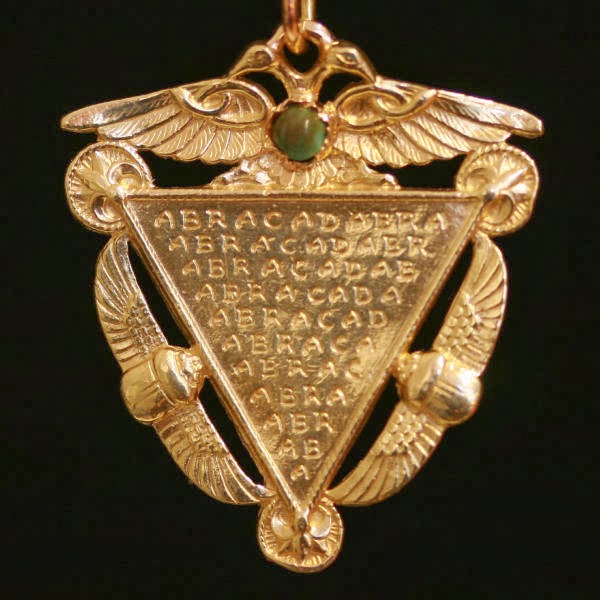
 |
| A Victorian-era penant with the Abracadabra talisman in the center. |
One common Aramaic fiction that tends to circulate all over the place is that the magic word “Abracadabra” is originally from an Aramaic phrase that means “I create as I speak” which is usually spelled out as אברא כדברא.
The thing is that, אברא כדברא cannot possibly mean “I create as I speak” and here is why:
אברא as a verb must come from ברי (/barey/ = to create) so it could easily mean “I will create.” It would also be pronounced /evre/.
The כ /ki-/ prefix could certainly mean “like” or “as.” So “I will create as…”
That leaves us with דברא, which could come from the root דבר which means “to direct” or “to lead” however, given the context, it cannot possibly be a verb. It just doesn’t fit. It would have to be a noun, and some nouns that could work (assuming later Eastern Aramaic spelling) would be:
Abracadabra — [… Grotefend] derives it from the Persian Abrasax [sic] (the name of the Supreme Being) and the Chaldee [Aramaic] word דִּבּוּרָא (the utterance), so that the meaning of it is, “a divine oracle.” […] See Abraxas (p.27)
Abraxas — […] The latest suggestion is that it is the Aramaic for זו עוקא רבא “this is the great seal” read backwards. (p.33)
So, here it’s a Persian-Chaldee (Imperial/Official) Aramaic fusion with the Persian word coming from some more Aramaic read backwards.
Seems legit? No… no it obviously doesn’t.
Before the 1890s we find no mention of Aramaic at all, and the Abraxas hypothesis (as convoluted as it was with or without Aramaic) had the upper-hand when it came to Abracadabra’s folk etymology.
It’s not until the early 1900s that we start to see Aramaic hypotheses creep into the forefront. In Faiths of Man: A Cyclopædia of Religions, Volume 1 (1906) we find:
Abraxas, Abrasax, Abracadabra, Ablathanabla, Abanathabla – Various terms on Gnostik charms —see Rivers of Life, i, p 511. [The translations are much disputed. Probably they are Aramaic sentences: Abrak ha dabra, “I bless the deed”: Ablaṭ ha nabla, “I give life to the corpse”: Abana thabla, “Thou our father leadest”– ED.] The Persian sun-god was seen in the Greek letters Abraxas, representing in numbers 365 — the days of the solar year. This word, placed on an amulet or seal, exorcised evil spirits, and was explained by Semites as meaning Abra-Sheda-bara, “go out bad spirit out [sic]” [or perhaps better, Abrak ha āsh “I bless the man.” — ED.]
In 1922 in Occult Review,
The word ABRACADABRA is a combination of short Aramaic words.
In 1937 in “The Review of Religion – Volume 2,”
Abracadabra, which originally is an Aramaic sentence meaning, “Fade away as this word is fading.”
In 1967 in “The Saturday Review,”
More plausible, perhaps, is derivation from Aramaic abhadda kedabrah, “vanish at this word,” a suitable incantation for warding off maladies.
In 1976 in the book “Strange Customs, how Did They Begin?” by R. Brasch we see a Hebrew explanation in two snippets (sadly out of context for me as Google Books won’t give the entire context):
Abracadabra was a contracted quotation from the Psalmist’s call on God (Ps. 144; 6) to “cast forth lightning” (in Hebrew, b’rok barak) to scatter the evil … On the contrary, abracadabra was the actual (Aramaic or Greek) name of a powerful demon.
In 1977 in the book “Abracadabra” by Stephen Jay we see a very familiar form that was later adopted by J. K. Rowling in the Harry Potter series:
May be from the Aramaic: Avada Kedavra, “May the thing be destroyed.”
And starting in the 1980s, more etymologies than I can list here exploded in printed books and magazines. Everyone “knew” it had to be in Aramaic, and folks were diligently searching for (and guessing) what Aramaic words it might be, and what they mean in translation.
So where did “I create as I speak” come in? During that crazy time of rampant speculation, it was merely lost in the shuffle. It’s when we catch up with the dawn of the Information Age that we find it appear on the Internet via the Straight Dope message board on March 25, 1999:
In this week’s column, Cecil gives three explanations for the term “Abracadabra”, but none of them is the one I had heard while growing up. I am an Orthodox Jew, and I had always been told that it comes from the Hebrew “Abra”, meaning “I will create”, “Ke-dabra”, meaning (roughly) “as I speak”…i.e., invoking the divine powers of creation-through-speech as in Genesis.
And a response on April 18th confirms the source as:
A source for the “Abracadabra” etymology: in “The Book of Words” (Woodstock, VT: Jewish Lights Publishing, 1993, p. 11), Rabbi Lawrence Kushner mentions that “The Aramaic for ‘I create as I speak’ is avara k’dvara, or, in magician’s language, abracadabra.”
A name! We apparently have Rabbi Kushner to blame for publishing this particular etymology, but we cannot blame him for what happened next.
From this one message board it spread like all misinformation does on the Internet: Like wildfire. Faster than truth. Early searches returned the message board post, and (like all things magical or occult-ish) people re-posted the etymology without citing the source. With the rise of Social Media it quickly became a canonized meme, repeated verbatim sans source on Twitter and Facebook at least 5 or 6 times a day (or so my own feeds pull in). It kept on doing this again and again, like some malevolent faux-etymology spreading machine, until it upset one linguist so very much that he felt he needed to take the time to write a very lengthy and emotional blog post about it before he took drastic measures to stem the tide of bad etymology and blew up the Internet to stop it from catching!
Ok… Well… maybe not that last one. Otherwise you wouldn’t be reading this, and besides even doing such a thing would probably just drive it underground. 🙂
In any case, to summarize and review the state of the matter:
And that is the final word.
Peace,
-Steve
UPDATE: Jan 30 2014 – As Jim Davlla mentions on his blog which he linked to in the comments below, there is a bit of nuance that I don’t think I made as clear as I could have in the beginning of my article above. There certainly was some free borrowing going on between Hebrew and Aramaic (in both directions, even) in the Rabbinic period to time that Kabbalah was forming and even to this day it continues. The root דבר was not directly attested in Aramaic as a verb, but was inflected as a noun in various ways in a few dialects of Jewish Aramaic (דביר, דיבור), but in most of these cases it was simply calqued for religious jargon (where general glosses might be favored by some lexicographers, it was more specifically for where דבר is translated from Hebrew, adapted as the name of a particular Hebrew prayer, etc.). Calques are a gray nether-area between languages, and when it comes to דבר in Aramaic vocabulary, I’m not convinced that it integrated enough to call it “Aramaic” without *serious* qualification. 🙂